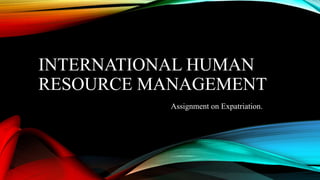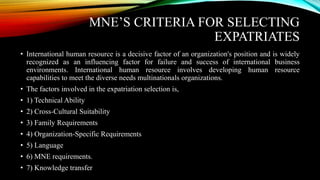Ihrm expatriation
- 1. INTERNATIONAL HUMAN RESOURCE MANAGEMENT Assignment on Expatriation.
- 2. EXPATRIATION • The employees’ expatriation (the transfer of a professional to work in a foreign company ́s unit for a certain time or not), is an usual strategy adopted by companies which have operations in more than one country and aims to expand markets, provide international career to their employees (development), transfer specific knowledge, fill the needs of specialized workers, leadership development, implementation of new projects, etc. • An expatriate (often shortened to expat) is a person temporarily or permanently residing, as an immigrant, in a country other than that of their citizenship. The word comes from the Latin terms ex ("out of") and patria ("country, fatherland").
- 3. FAMILY REQUIREMENTS FOR EXPATRIATION • Knowledge of the language • Socio-cultural and economic differences • The family aspect: the integration of the spouse can be difficult because they do not have the relationships which the expatriate has at work. • Destabilizing aspects of expatriation • Example: • Physical: climate, illnesses, • Habitual: gestures, looks, emotions, • Symbolic: linguistic, conventional.
- 4. MNE’S CRITERIA FOR SELECTING EXPATRIATES • International human resource is a decisive factor of an organization's position and is widely recognized as an influencing factor for failure and success of international business environments. International human resource involves developing human resource capabilities to meet the diverse needs multinationals organizations. • The factors involved in the expatriation selection is, • 1) Technical Ability • 2) Cross-Cultural Suitability • 3) Family Requirements • 4) Organization-Specific Requirements • 5) Language • 6) MNE requirements. • 7) Knowledge transfer
- 5. THANK YOU PRESENTATION BY: CHETAN SINGH B.M





